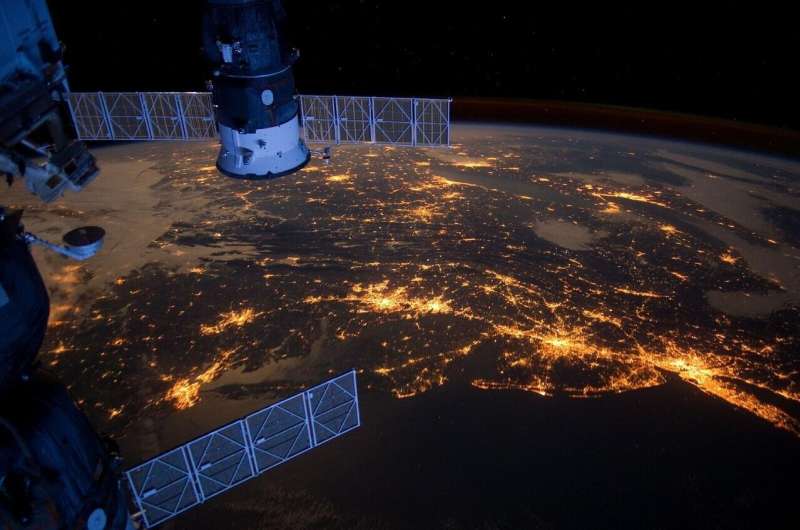This article has been reviewed according to Science X's editorial process and policies. Editors have highlighted the following attributes while ensuring the content's credibility:
fact-checked
trusted source
proofread
How 'zero-trust' could enable safe data exchange in space

Incidents such as the 2021 Colonial Pipeline hack and ransomware attacks on U.S. colleges and universities illustrate the importance of robust cybersecurity measures that protect the technologies and services that people rely on for everything from utilities and education to banking and communication.
Gregory Falco, assistant professor in the Johns Hopkins Institute for Assured Autonomy and the Whiting School of Engineering's Department of Civil and Systems Engineering, is working to safeguard exchanges of data and services across the space systems that countries and companies increasingly use for business and communication. Last summer, Falco received a Young Faculty Award from the Defense Advanced Research Projects Agency for his work on the concept of the zero-trust space service marketplace, where software continuously monitors and protects data exchanges.
What is a 'zero-trust space marketplace?'
A zero-trust space marketplace allows companies around the world in the field of space-based services and data to collaborate securely and safely, and to engage in transactions with each other across space systems. Right now, space systems manufactured by one company are unable to easily communicate with space systems manufactured by another company. When two systems do communicate, it's only across trusted parties—usually, systems made by the same manufacturer.
With the diversity of providers making space systems these days, not being able to interact in a trusted way is a lost opportunity for all involved. This is why we need a marketplace that any party can work through to receive or deliver data and services safely and securely. Such a marketplace must be "zero-trust," meaning that exchanges are continuously validated via software (no humans involved in making decisions) and that there is no implicit trust between the exchanging parties.
This means that every request or exchange is authenticated separately, and nothing is carried over from previous sessions or requests. One hallmark of the zero-trust space marketplace is that it will provide contracts and agreements to providers to ensure that all providers are able to work together in a safe and secure environment.
While there are currently efforts at DARPA through its Space-based Adaptive Communications Node program to develop the hardware and communication systems necessary to enable different satellites of different manufacturers to talk to one another, the software is still needed to facilitate this zero-trust service exchange.
What are some examples of how a 'zero-trust space marketplace' might benefit society?
One example that might resonate with individuals has to do with their cell phones. In the event of an emergency, SOS messages can now be made from cell phones to satellites. But what if your phone is not in proximity to a satellite that is contracted to work with your phone provider? Your phone may struggle to connect until it is in range of a contracted satellite. A zero-trust space marketplace would allow for other satellites outside your phone's network to contract with your phone provider ad hoc, which could provide the necessary services you need at a crucial time.
Another industry that will likely be impacted by the zero-trust space marketplace is related to climate change. There are many satellites that observe the Earth and capture images that need to be stored somewhere. These images are enormous and fill up storage quickly but need to be kept secure until scientists and researchers can download the images to analyze. In this situation, the zero-trust space marketplace might allow satellites to purchase additional storage space from other satellites, like on the cloud, where images of Earth can be safely stored, allowing the Earth observing satellites to continue to capture images.
How will a zero-trust space marketplace impact manufacturers and providers?
As I mentioned before, there is currently no way for providers to work together to exchange data or services between space systems easily. A zero-trust space marketplace will offer a way for providers and manufacturers to work together and provide the architecture for these collaborations to be successful. The zero-trust space marketplace will enable an interconnected heterogenous ecosystem for space systems.
What are some of the challenges to establishing a zero-trust space marketplace?
Building the software to facilitate the zero-trust space marketplace will take time and coordination given the unique size, weight, power, and compute limitations of a space vehicle. Flight software can be hard to work with given there are so many interdependencies. For example, if one part of the space vehicle breaks, the entire vehicle will no longer operate.
Further, the zero-trust space marketplace needs to be fully autonomous because the minute a human operator is involved, it could compromise trust that was established between two machines. That is one of the things that the Johns Hopkins Institute for Assured Autonomy is focused on—ensuring that systems are fully autonomous and can operate in a trustworthy manner without human input.
How will a zero-trust space marketplace ensure that different manufacturers/providers are able to effectively collaborate? What mechanisms will be in place to make the marketplace successful and help groups adopt and accept it?
The zero-trust space marketplace offers many benefits to satellite operators and end users. It will help reduce operator costs, generate revenue, and diversify its portfolio of offerings. This will even allow satellites to work and contract with others from adversarial nations because the contracts create a validation structure and a level playing field for all involved.
Zero-trust space marketplaces are predicated on space systems communicating effectively and allow for the interoperability across satellite communications—something we will see happen in the near future.




















